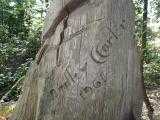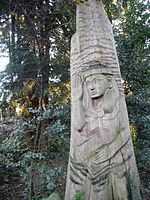Dudley C. Carter
| Dudley C. Carter | |
|---|---|
 | |
| Born |
May 06, 1891 Stave Falls, B.C |
| Died |
April 7, 1992 Kings County, WA |
| Occupation | Artist and Woodcarver |
Dudley C. Carter (May 6, 1891 – April 7, 1992) was an artist and woodcarver from the Pacific Northwest. His works are on display in the U.S. states of Washington, Oregon and California. There are also works of his on display in Japan and Germany.
Carter was a participant in the "Art in Action" program during the 1940 season of the 1939-40 Golden Gate International Exposition (GGIE). He was also the first King County, Washington Parks and Recreation artist-in-residence when he was 96 years old.
Early life
Carter was born to a pioneer family on May 6, 1891 in New Westminster, Canada. His father was originally from Barbados, and his mother was from Quebec, they came west in 1891, shortly before Dudley was born.[1] He was a timber cruiser and forest engineer most of his life, exploring and mapping Pacific Northwest wilderness. The chief inspiration for Carter's art was his childhood among the Kwakiutl and Tlingit Indians.[1] He moved to Washington state in 1928.[1]
Diego Rivera and City College of San Francisco
Carter was a participant during 1940, in the "Art in Action" exhibitions during the 1939-1940 Golden Gate International Exposition (GGIE) on Treasure Island. During that time he became a friend of Diego Rivera, who included Carter three separate times in his mural Marriage of the Artistic Expression of the North and of the South on this Continent. and once in the Pan American Unity mural. Rivera said the following about Carter:[2]
"Here in the Fine Arts Building there is a man carving wood. This man was an engineer, an educated and sophisticated man. He lived with the Indians and then he became an artist, and his art for [sic] was like Indian art—only not the same, but a great deal of Indian feeling had passed into him and it came out in his art. Now, what he carves is not Indian any more, but his own expression—and his own expression now has in it what he has felt, what he has learned from the Indians. That is right, that is the way art should be. First the assimilation and then the expression. Only why do the artists of this continent think that they should always assimilate the art of Europe? They should go to the other Americans for their enrichment, because if they copy Europe it will always be something they cannot feel because after all they are not Europeans."—Diego Rivera
There are three works by Carter on the City College of San Francisco Ocean Campus, The Ram (sometimes called the Mountain Ram),Goddess of the Forest, and The Beast.[3] Dudley had donated The Ram because he knew it was the school mascot and it had been part of the Golden Gate International Exposition's Arts in Action exhibition. The Ram sculpture stood outside on the campus periodically changing locations from time to time, students would coat it in paint with campus colors red and white. Sometimes rival schools would repaint The Ram in their own school colors. By 1980 The Ram had many layers of paint and damage and in Spring of 1983 it was restored by Carter with use of a pick axe and its original, natural redwood.[3] Currently located in the lobby of Conlan Hall, on the Ocean Campus.[3] The Goddess of the Forest is another redwood scupture created during GGIE, it is very large standing at 26 feet tall and had a girth at the base of 21 feet. For years this piece was located at Golden Gate Park, until 1986 when it began to show distress and decay. It was then moved to CCSF to an indoor location awaiting restoration.[3]
Influence in Washington state
When 96 years old, Carter became the first artist-in-residence of the King County Parks and Recreation Department.[4]
He had a home at 7447 159th Place NE, Redmond, Washington. Located in Slough House Park, the house was named "Haida House Studio".[5]
After a brief illness the artist died in his sleep at the Slough House residence, just a month short of his 101st birthday on April 7, 1992.[5] He is buried near Stave Falls, B.C.[1]
Slough House is now owned by the city of Redmond.[5] The artist bequest included his art studio, fashioned in the manner of a native Haida dwelling, and a group of monumental wood sculptures of the sort that brought the sculptor to international prominence.[5]
Upon his death, Congressman Rod Chandler honored Carter with remarks in the Congressional Record.[6]
Selected works
Various works by Carter:
- Rivalry of the Winds, at Redmond Library, carved in 1932
- The Ram, at City College of San Francisco, Conlan Hall, carved in 1939-1940
- The Goddess of the Forest, at City College of San Francisco, carved in 1939-1940
- The Beast, at City College of San Francisco
- Forest Deity, at Bellevue Square Shopping Center, Bellevue
- Visions of the Deep, at the Northwest Arts Center, 9825 Northeast 24th Street, Bellevue
- Chief Spokan Garry, at St. Dunstan's Church of the Highlands Parish, Shoreline, Washington, carved in 1961
- Adventures in Western Waters, at the entrance to Northwest Hospital, 1550 North 115th Street, Seattle, carved in 1987
- A totem pole at the entrance to Northgate Shopping Center, Seattle, in 1952. Removed from the mall in 2007; extensively restored by the Washington Suquamish tribe and placed on the Suquamish Clearwater Casino Resort grounds in February 2008[7]
- The Legend of the Moon, at King County's Marymoor Park in Redmond, carved in 1977
- Three works titled Faith, Hope, and Love on entrance wall of Bayview Retirement Community, 11 W. Aloha, Queen Anne. carved approx. 1960
- High Mountain Companions at Dudley Carter Park, Redmond, Washington.
| Gallery of Works | ||||
|---|---|---|---|---|
|
References
- ↑ 1.0 1.1 1.2 1.3 Tarzan Ament, Deloris; Long, Katherine (April 9, 1992). "Dudley Carter, 100, An Artist With Wood Who Lived Simple Life". The Seattle Times. The Seattle Times. Retrieved September 26, 2014.
- ↑ Theme, Diego Rivera Mural Project. Retrieved March 25, 2006.
- ↑ 3.0 3.1 3.2 3.3 Schniewind, Arno P.; Baird, Roger (1996). "Rescuing Dudley Carter's Goddess of the Forest". WAG Postprints (Wooden Artifacts Group (WAG) of the American Institute for Conservation). Retrieved September 26, 2014.
|first3=missing|last3=in Authors list (help) - ↑ "Looking Ahead, Looking Back". King County Archives. King County. December 19, 2008. Retrieved September 26, 2014.
- ↑ 5.0 5.1 5.2 5.3 Lambert, Lyn Fleury (2007). "Dudley Carter, will Redmond's Most Famous Artist Have a Park to Call Home?". Redmond Historical Society. Redmond Historical Society. Retrieved September 26, 2014.
- ↑ Rod, Chandler (April 9, 1992). "Congressional Record 102nd Congress (1991-1992) In Remembrance of Dudley Carter". The Library of Congress, Thomas Home. The Library of Congress,. Retrieved September 26, 2014.
- ↑ "Northgate Mall Totem Pole Restored to its Original Glory". Kitsap and Beyond. February 20, 2008. Retrieved September 26, 2014.
